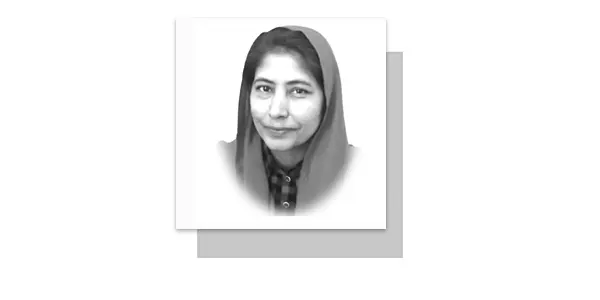AFTER independence, the founding father Muhammad Ali Jinnah gave an inclusive image about the new country that how the new Muslim state should be made a peaceful, progressive, and a moderate state in the world. In a series of speeches he delivered, as Governor General of Pakistan, provided and defined the path to the policy makers that how Pakistan should be; about Pakistan’s Constitution he said, “The Constitution of Pakistan will be of a democratic type, embodying the principles of Muslim democracy. Our salvation lies in following the golden rules of conduct set for us by the Prophet of Islam (PBUH]. The Quran is the “general code for the Muslims a religious, economic, social, judicial, criminal and civil code”. The Objective Resolution-1949 defined Islamic principles – this resolution remained the core part of Ayub’s Constitution 1962 – the Constitution of 1973 also included the Objective Resolution and Article 227 states, “all existing laws shall be brought in conformity with the injunctions of Islam as laid down in the Hoy Quran and Sunnah, and no law shall be enacted which is repugnant to such injunctions”. Theoretically, all three Constitutions – 1956, 62 and 73 provided Islamic clauses but it’s never been practiced in accordance with Quran or Sunnah – these sources, if employed, are the guarantee of rule of law and welfare state. Theoretically we admire Islamic principles but empirically we avoid practicing them.
If we evaluate Jinnah’s principles, providing contextual explanation is crucial for understanding any speech. As the President of the first Constituent Assembly, Jinnah categorically defined that the future of the new state lay in Islamic principles. Though he preferred ‘parliamentary democracy’ in new Pakistan but he wanted to practice the golden rules set by the Last Prophet (PBUH). Jinnah tasked to the legislators to make Constitution. But the post-Jinnah Pakistani political leaders could not frame a democratic Constitution and ruled Pakistan without Constitution till 1956 – the first Constitution took nine years after independence and was abrogated in 1958. The 1950s period was politically instable that led the country to experience its first military rule.
Since inception, Pakistan has experienced different political system. Four military regimes and civilian rulers, mainly from the two national political parties, failed to practice Jinnah’s political philosophy and principles. However, all of them politicized the diversity of culture and divergence of opinions in different regional units- played ethnic and religious cards for personal interests. Their political behaviour, policies never represented Jinnah’s Pakistan who strongly believed in “faith, unity, and discipline”. Four Federating Units are being governed by the people who may not understand the theory of Federation-we have to accept this reality. Hence, Jinnah’s Pakistan is waiting for socio-economic justice, rule of law and corruption free society.
After Jinnah’s death, Pakistan has not been ruled by statesmen or visionary leaders, though some of them made efforts to strengthen Pakistan vis-à-vis India and develop the country’s infrastructure. However, they failed to build strong institutions. Mostly, rulers promoted ‘patrimonialism’ instead of democratic norms and values. But only the ruler and his party are not responsible for developing an undemocratic culture in Jinnah’s Pakistan. There are other core stakeholders who equally sponsored the Pakistani ruling class and governed public offices badly. Ensuring good governance is the prime responsibility of the bureaucrats. Founding father knew the bureaucratic behaviour. He gave very lucid message to the Pakistani bureaucrats on March 25, 1948, in his address to the Gazetted Officers at Chittagong Jinnah said, “Your conduct and dealing with the people in various Departments, in which you may be; wipe off that pat reputation- you are not rulers. You do not belong to the ruling class, you belong to the servants. Make the people feel that you are their servants and friends, maintain the highest standard of honour, integrity, justice and fair-play. If you do that, people will have confidence and trust in you and will look upon you as friends and well wishers”.
Jinnah wanted to establish a welfare state. If we look at his historical speeches from 1943 to 1944 Jinnah assertively stated that the “new Muslim state will be a true welfare state, based on principles of Islamic social justice with equal rights for all citizens – including minorities. Jinnah had observed Muslims’ plight in united India, where they were badly treated, discriminated against and targeted by Hindu extremists—they [Muslims] would not get their fundamental rights. Today’s India, under Prime Minister Modi, has proven Jinnah’s vision was right and his ideology to defend Muslims ‘as a separate nation’ was inevitable. Today, Pakistan is facing the gravest internal challenges- economic, political, societal and institutional issues. Emerging primary external challenges is Tehreek-e-Taliban Pakistan (TTP) and Afghanistan – their nexus is a grave threat to Pakistan’s security. But sincere determination to serve the country, and commitment to be loyal with Jinnah’s country may help to deal with all existing and existential threats and challenges in Pakistan. Jinnah’s Pakistan is not for a particular faction- it is for all and needs due attention from its people.
—The writer is Assistant Professor, Politics and IR, International Islamic University, Islamabad.
Email: nasreen.akhtar@iiu.edu.pk










